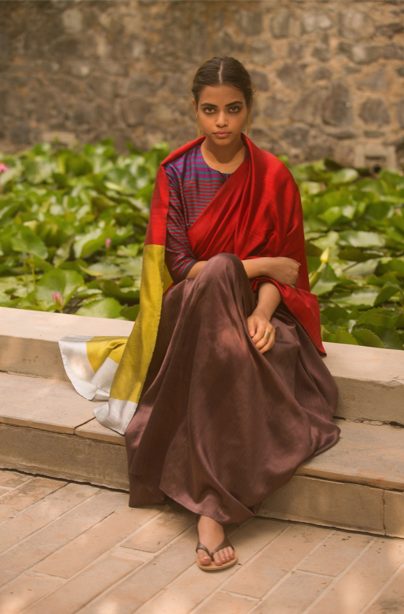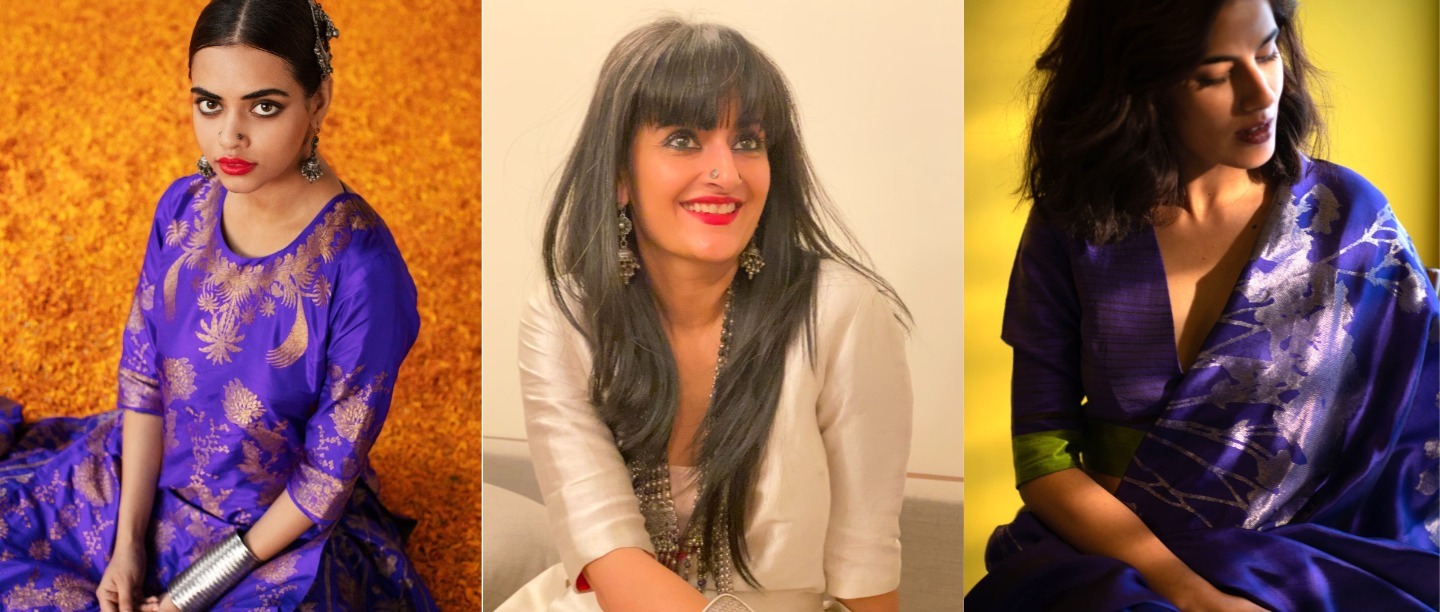Since the inception of her label in 2012, designer Payal Khandwala had a very strong vision for the voice of the brand. Handwoven textiles had to be an integral part of her design language. The process called for the development of textiles with Payal’s unique aesthetics–just working with what already existed was simply out of the question. Thus, she decided to design the textile from the yarn up and today, the results speak for themselves. Almost a decade later, Payal’s eponymous label is a phenomenon. In a recent conversation with POPxo, the designer talked about her love for handloom and how her brand is creating luxury in a truly India Modern context.
Philosophy Of The Label

When Payal first started working with Banarasi silks, the purpose was to use the textiles in a way that was not overtly traditional. She wanted to create something more contemporary while retaining its heritage value so as to appeal to a larger audience. Speaking of her designing process, Payal shares, “Our handlooms need little reinventing, but to be able to experiment with this sea of knowledge and push what this art can achieve in a direction that feels more aligned to the philosophy of the label is what excites me most. For example, to make the minimal, fuss-free silhouettes I love, how do I make them more cherished, more distinct? How do I make the sari more approachable, less an option for a puja more for a dinner? How do I retain what embroideries can do, with the drama and richness of a woven textile but keep the garment lighter, more practical and softer to touch?”
As a designer, Payal loves tackling a problem, discovering an elegant solution and playing with colour and yarn to create a signature tapestry with our endless legacy of rich crafts. Ambitious as it sounds, she shares that the process has surprisingly been quite humbling.
A Confluence

Payal’s design aesthetics and vision find their anchor in two different albeit equally vibrant handicrafts of India. In Bengal, they have been creating textiles that help them colour block, a signature Payal Kahdwala detail. The designer has spent years researching and developing textiles that have the right weight, drape, and texture that each silhouette in her designs requires. She shares, “Recently our explorations in Jamdani weaves have yielded great results, where we took this arduous, traditional weave and made a series of limited edition silk sarees with silver metallic yarns. Except the motifs were unlike what you see typically in jamdani woven saris.”
In Benaras, she has worked to develop brocades that can be applied to more modern silhouettes. They also developed the engineered brocade in 2018. “These engineered garments are exclusive to the label because each panel, neckline and hem was designed specifically for a particular garment. This meant reversing the design process in a way. We had to map the blueprint of the kurta much before it was stitched and it was conceptualised on the loom before the weaving even started. This has been close to my heart because the final outcome is so precious, but it makes them even more special because the precision this process requires is so challenging,” adds Payal.
Fashion, Passion, & Purpose

Payal’s love for handlooms comes from her affinity to all things exquisite. As she shares, “I’ve always been a keen collector of special things that have taken the luxury of time and skill to make. Be it vintage jewellery, textiles or even watches. And I see over time how our patterns of wanting to buy more for less, has upended the livelihoods of lakhs of our weavers every year. So I feel very strongly that in whatever capacity I can, I continue our support to the handloom ecosystem.”
Payal feels that the onus lies on all of us to encourage a new generation of skilled artisans to follow their forefathers with a promise of a bright and certain future. Sadly, that’s not what’s happening right now. The newer generation from the artisan families is getting disillusioned from the craft owing to paltry and unpredictable incomes. In the coming years, there will be a dearth of artisans. This is exactly why it is our duty to raise awareness about our glorious but dying crafts. It is important to understand why a garment might take longer and cost a bit more and yet why it has a signature that is world-renowned. “There is an urgency with which we must buttress this sector, as a designer yes, but also as a consumer. It’s also important to note that we mustn’t do this just because it seems like a trend right now to wear something sustainable and handcrafted, but because our continuous support is the only thing that will sustain the lives and families of our many unsung heroes,” adds Payal.
Towards Creating An Environment Of Pride

If we really want to create an environment of pride for homegrown products, then it’s vital that we as consumers change our habits and designers focus on handloom crafts. This calls for a team effort. Yes, we have managed to start a conversation but what we need now is a concerted effort to create a demand for handcrafted products for this system to sustain and thrive.
“As designers, we must understand fair wages, benefits, make payments in time, economic stability for our weavers and the role we play in creating demand for this sector. As consumers, we must understand what it takes to really make a handwoven garment. The time, the effort, the art, the conditions in which our artisans work, the cost of the garment, the intuition that comes from skills passed down from generations and the decades of knowledge that each weaver brings. Only if approached with care and attention, can we truly reimagine a bright future for this time-honoured craft,” concludes Payal.
To celebrate the ethereal beauty and the undeniable allure of Indian handicrafts, we are observing a handloom week this August through a series, titled Seven Days of Handloom. The series aims to introduce designers and brands who are working to preserve and reinvent the Indian handlooms. Click here to read about Handloom Rugs, Chanderi, Maharashtrian Handloom, and Kanchipuram.
Featured Image Courtesy: Payal Khandwala



